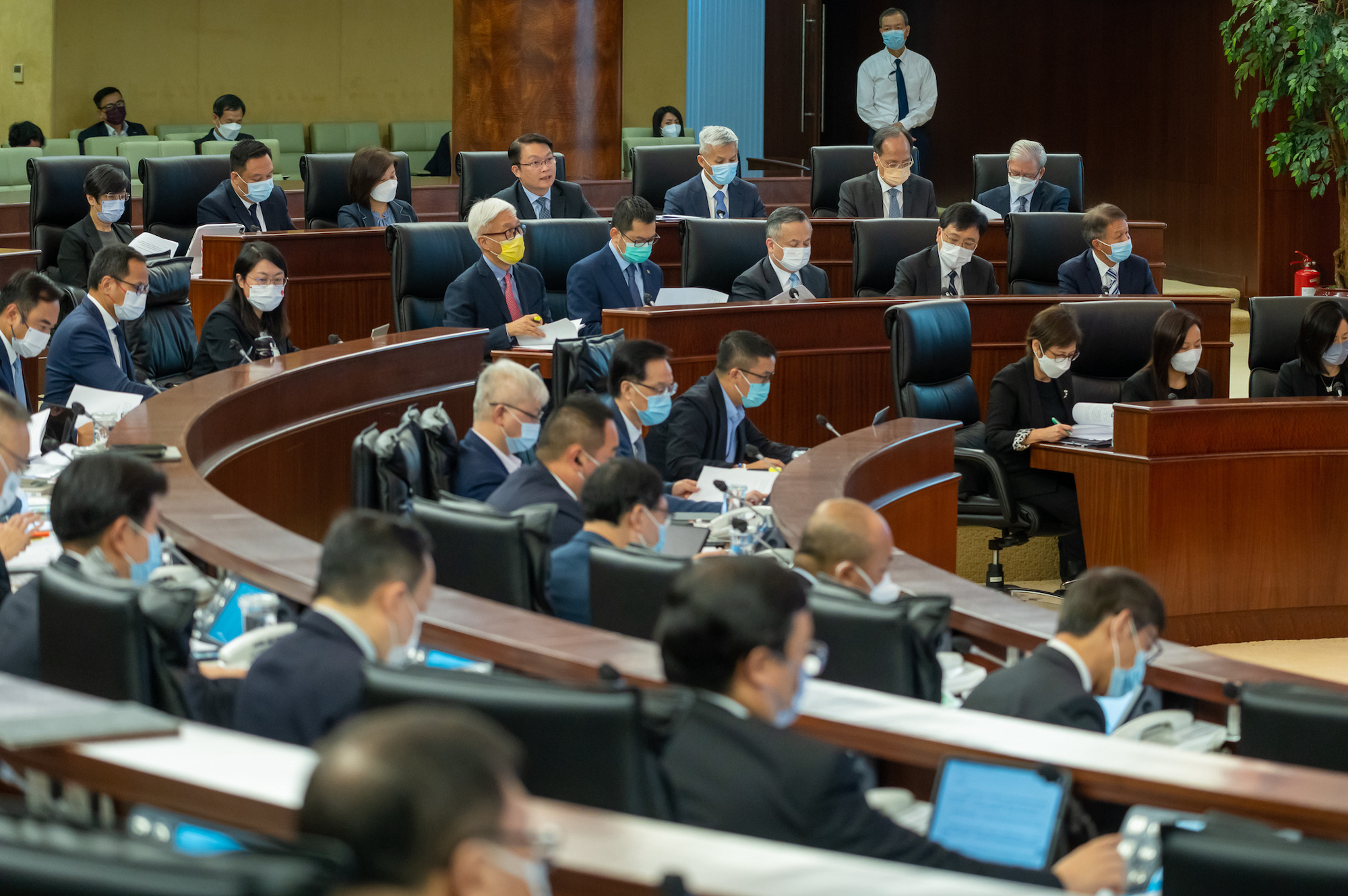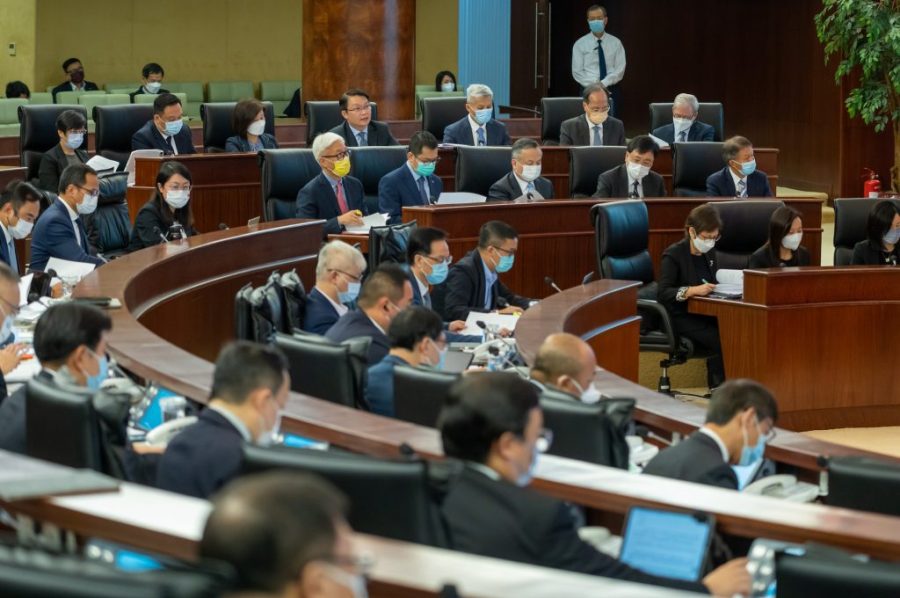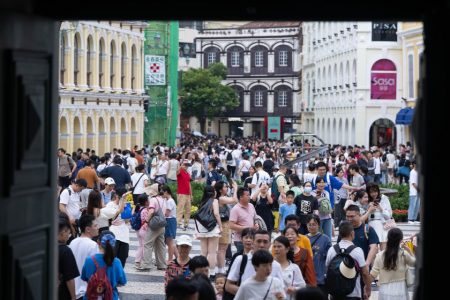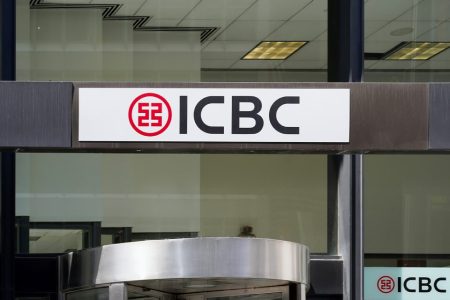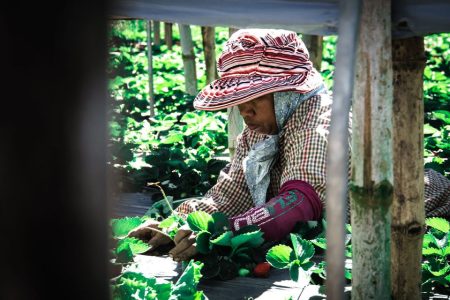Macao can look forward to a steady economic recovery next year, with substantial numbers of tourists drawn back to the city and massive investment in new infrastructure projects, Secretary for Economy and Finance Lei Wai Nong has said.
The policy secretary underlined that the government’s e-consumption benefit scheme will not become a permanent measure because it is merely a “special and temporary” measure that aims to relieve residents’ financial hardship resulting from the Covid-19 pandemic.
Lei was speaking during a one-day Q&A session in the legislature’s hemicycle about his portfolio’s policy guidelines for next year.
Lei underlined that the government’s work for Macao’s economy next year will put special emphasis on promoting the city’s economic recovery and economic diversification while fully engaging in the development of the Guangdong-Macao Intensive Cooperation Zone in Hengqin.
“The nation is always the strongest backing for Macao’s development,” he said.
“With the central government’s support, Macao will have various favourable conditions next year for its economic development, in terms of both the external environment it will face, and its internal development momentum.”
In terms of the external environment next year, Lei said, the global economy will continue to have many elements of uncertainty. Nevertheless, Lei said that with the continuous recovery of commercial and trade activities among countries and regions worldwide, and with the central government’s strengthened capability to bring Covid-19 under control while ensuring continuous socioeconomic development, the national economy will stay in a stable and good condition.
Lei underlined that with the central government’s resumption of mainland Chinese’ electronic applications for a travel permit to Macao, which was launched on 1 November, and with the upcoming resumption of tour groups from Fujian, Jiangsu, Zhejiang and Shanghai, the local government expects the number of visitor arrivals to Macao next year to “notably” recover.
Lei said that the expected recovery in the number of visitor arrivals next year will help boost Macao’s community economy, adding that this would enable the local government to obtain “concrete” achievements in its ongoing work to boost the city’s economic recovery.
In terms of Macao’s internal development momentum, Lei said, the government will make an all-out effort to adopt a 1+4 model to diversify Macao economy.
The 1+4 model was laid out last week by Chief Executive Ho Iat Seng’s 2023 Policy Address.
It stressed that the government will consolidate the development of the city’s tourism and leisure industry while putting special emphasis on promoting big health, modern finance, hi-tech and conventions and exhibitions as well as culture and sports.
Lei also noted that Macao’s new gaming concessions, which are slated to start on 1 January next year, will be required to invest more intensively in non-gaming projects.
Lei said that the development of non-gaming elements was needed to “change” Macao’s perceived image as nothing more than a gambling city.
The policy also underlined that Macao’s integration into Hengqin’s development will be a “big trend” for its development.
Furthermore, Lei said that in conjunction with the national development strategies, Macao will enrich and expand the functions of its role as a business service platform between China and Portuguese-speaking countries.
Veteran directly-elected lawmaker José Maria Pereira Coutinho suggested during yesterday’s Q&A session that the government should issue an MOP 8,000 consumption subsidy to every local resident every quarter next year.
In reply, Lei said that while the government respects his decision to make the suggestion, the government “absolutely” does not agree with it.
The government has rolled out its electronic consumption benefit scheme since the Covid-19 pandemic started to affect Macao in early 2020.
This year’s electronic consumption benefit scheme which started on 1 June and will end on 28 February next year comprises a MOP 5,000 start-up fund and a MOP 3,000 immediate discount grant. In addition, the government started to issue another MOP 8,000 consumption subsidy late last month with the aim of relieving residents’ financial hardship resulting from the Covid-19 outbreak this summer.
The new MOP 8,000 subsidy, which has been topped up into mobile payment platform accounts or e-consumption smartcards, can be used until 30 June next year.
The new MOP 8,000 consumption subsidy, which is no longer divided into the two segments of a start-up fund and an immediate discount grant, is officially known as the Living Subsidy.
Lei underlined yesterday that the government has rolled out its electronic consumption benefit scheme merely on a temporary basis as a special measure to respond to the adverse impact of the Covid-19 pandemic on the local economy, because of which, he said, the scheme will not become a permanent financial support system.
Lei said during yesterday’s Q&A session that the government will allocate MOP 650 million next year to be used for its measures to attract visitors from a wider range of destinations, such as rolling out more types of hotel and transport discounts and special offers.
Lei also said that in response to the weak local market demand resulting from the Covid-19 pandemic, the government will continue to increase its investment in public infrastructure projects. He said that the government has budgeted MOP 22.3 billion for new infrastructure projects next year, The Macau Post Daily reported.
Macao Monetary Authority President Benjamin Chan Sau San said during yesterday’s Q&A session that Macao’s financial industry has “notably” expanded since the start of the Covid-19 pandemic, and that the city’s financial industry last year accounted for 15.4 per cent of its gross domestic product, becoming Macao’s second-largest sector.
